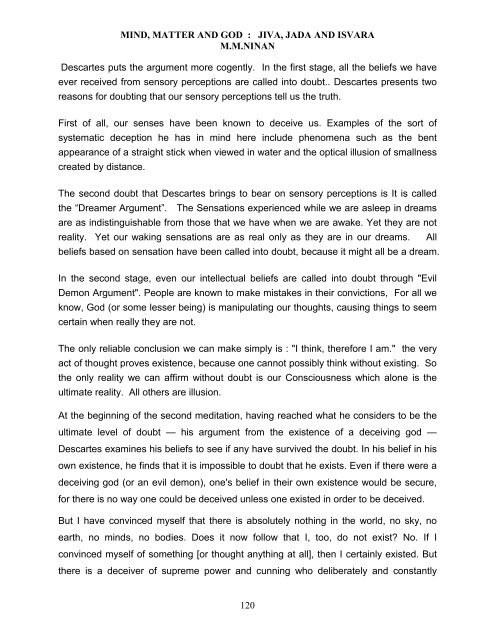Jiva
You also want an ePaper? Increase the reach of your titles
YUMPU automatically turns print PDFs into web optimized ePapers that Google loves.
MIND, MATTER AND GOD : JIVA, JADA AND ISVARA<br />
M.M.NINAN<br />
Descartes puts the argument more cogently. In the first stage, all the beliefs we have<br />
ever received from sensory perceptions are called into doubt.. Descartes presents two<br />
reasons for doubting that our sensory perceptions tell us the truth.<br />
First of all, our senses have been known to deceive us. Examples of the sort of<br />
systematic deception he has in mind here include phenomena such as the bent<br />
appearance of a straight stick when viewed in water and the optical illusion of smallness<br />
created by distance.<br />
The second doubt that Descartes brings to bear on sensory perceptions is It is called<br />
the “Dreamer Argument”. The Sensations experienced while we are asleep in dreams<br />
are as indistinguishable from those that we have when we are awake. Yet they are not<br />
reality. Yet our waking sensations are as real only as they are in our dreams. All<br />
beliefs based on sensation have been called into doubt, because it might all be a dream.<br />
In the second stage, even our intellectual beliefs are called into doubt through "Evil<br />
Demon Argument". People are known to make mistakes in their convictions, For all we<br />
know, God (or some lesser being) is manipulating our thoughts, causing things to seem<br />
certain when really they are not.<br />
The only reliable conclusion we can make simply is : "I think, therefore I am." the very<br />
act of thought proves existence, because one cannot possibly think without existing. So<br />
the only reality we can affirm without doubt is our Consciousness which alone is the<br />
ultimate reality. All others are illusion.<br />
At the beginning of the second meditation, having reached what he considers to be the<br />
ultimate level of doubt — his argument from the existence of a deceiving god —<br />
Descartes examines his beliefs to see if any have survived the doubt. In his belief in his<br />
own existence, he finds that it is impossible to doubt that he exists. Even if there were a<br />
deceiving god (or an evil demon), one's belief in their own existence would be secure,<br />
for there is no way one could be deceived unless one existed in order to be deceived.<br />
But I have convinced myself that there is absolutely nothing in the world, no sky, no<br />
earth, no minds, no bodies. Does it now follow that I, too, do not exist? No. If I<br />
convinced myself of something [or thought anything at all], then I certainly existed. But<br />
there is a deceiver of supreme power and cunning who deliberately and constantly<br />
120


















